
Murray Leinster was a nom de plume of William Fitzgerald Jenkins, an American writer of genre fiction, particularly of science fiction. He wrote and published more than 1,500 short stories and articles, 14 movie scripts, and hundreds of radio scripts and television plays.

William Olaf Stapledon – known as Olaf Stapledon – was a British philosopher and author of science fiction. In 2014, he was inducted into the Science Fiction and Fantasy Hall of Fame.

Scientific romance is an archaic, mainly British term for the genre of fiction now commonly known as science fiction. The term originated in the 1850s to describe both fiction and elements of scientific writing, but it has since come to refer to the science fiction of the late nineteenth and early twentieth centuries, primarily that of Jules Verne, H. G. Wells and Arthur Conan Doyle. In recent years the term has come to be applied to science fiction written in a deliberately anachronistic style as a homage to or pastiche of the original scientific romances.

Children of the Atom is a 1953 science fiction novel by American writer Wilmar H. Shiras, which has been listed as one of "The Most Significant SF & Fantasy Books of the Last 50 Years, 1953–2002." The book is a collection and expansion of three earlier stories, the most famous of which is the novella "In Hiding" from 1948, which appeared on several "Best SF" lists. The book's plot focuses on children with superhuman intelligence.
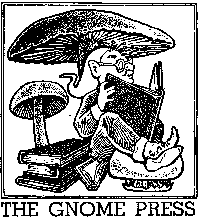
Gnome Press was an American small-press publishing company primarily known for publishing many science fiction classics. Gnome was one of the most eminent of the fan publishers of SF, producing 86 titles in its lifespan — many considered classic works of SF and Fantasy today. Gnome was important in the transitional period between Genre SF as a magazine phenomenon and its arrival in mass-market book publishing, but proved too underfunded to make the leap from fan-based publishing to the professional level. The company existed for just over a decade, ultimately failing due to inability to compete with major publishers who also started to publish science fiction. In its heyday, Gnome published many of the major SF authors, and in some cases, as with Robert E. Howard's Conan series and Isaac Asimov's Foundation series, was responsible for the manner in which their stories were collected into book form.
Galaxy novels, sometimes titled Galaxy Science Fiction Novels, were a series of mostly reprint American science fiction novels published between 1950 and 1961.
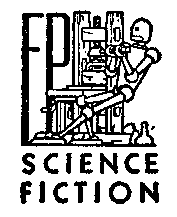
Fantasy Press was an American publishing house specialising in fantasy and science fiction titles. Established in 1946 by Lloyd Arthur Eshbach in Reading, Pennsylvania, it was most notable for publishing the works of authors such as Robert A. Heinlein and E. E. Smith. One of its more notable offerings was the Lensman series.
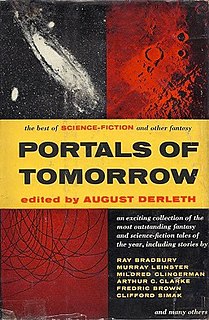
Portals of Tomorrow is an anthology of science fiction stories edited by American writer August Derleth, intended as the first in a series of "year's best" volumes. It was first published by Rinehart & Company in 1954. The stories had originally appeared in the magazines Fantasy and Science Fiction, Future, Esquire, Fantastic Universe, Galaxy Science Fiction, Blue Book, Startling Stories, Orbit, Astounding Stories and Beyond Fantasy Fiction.
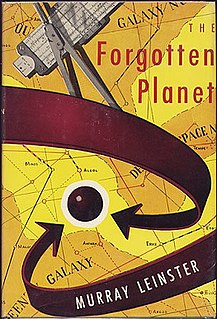
The Forgotten Planet is a science fiction novel by American writer Murray Leinster. It was released in 1954 by Gnome Press in an edition of 5,000 copies. The novel is a fix-up from three short stories, "The Mad Planet" and "The Red Dust", both of which had originally appeared in the magazine Argosy in 1920 and 1921, and "Nightmare Planet", which had been published in Science Fiction Plus in 1953.

Science Fiction Terror Tales is an anthology of science fiction horror short stories edited by Groff Conklin. It was first published in hardcover by Gnome Press in January 1955; it was reprinted, unabridged, by Pocket Books in March 1955, and reprinted again in June 1971. The first British edition was published under the alternate title Possible Tomorrows in hardcover by Sidgwick & Jackson in June 1972; a paperback edition was issued by Coronet under the same title in September 1973. It was later gathered together with the Donald A. Wollheim-edited anthology Trilogy of the Future into the omnibus anthology Science Fiction Special 9.

Colonial Survey is a 1957 collection of science fiction short stories by American writer Murray Leinster. It was first published by Gnome Press in 1957 in an edition of 5,000 copies. The collection was reprinted by Avon Books in 1957 under the title The Planet Explorer. The stories all originally appeared in the magazine Astounding.
Shasta Publishers was a science fiction and fantasy small press specialty publishing house founded in 1947 by Erle Melvin Korshak, T. E. Dikty, and Mark Reinsberg, who were all science fiction fans from the Chicago area. The name of the press was suggested by Reinsberg in remembrance of a summer job that he and Korshak had held at Mount Shasta.
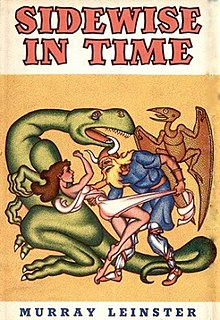
Sidewise in Time is a 1950 collection of science fiction short stories by Murray Leinster. It was first published by Shasta Publishers in 1950 in an edition of 5,000 copies. The stories all originally appeared in the magazines Astounding and Thrilling Wonder Stories.

Space Platform is a young adult science fiction novel by American writer Murray Leinster. It was published in 1953 by Shasta Publishers in an edition of 5,000 copies. It is the first novel in the author's Joe Kenmore series. The next, Space Tug, picks up almost immediately where Space Platform leaves off.

Space Tug is a young adult science fiction novel by author Murray Leinster. It was published in 1953 by Shasta Publishers in an edition of 5,000 copies. It is the second novel in the author's Joe Kenmore series. Groff Conklin gave it a mixed review in Galaxy, noting that it held "plenty of excitement though not much maturity." Boucher and McComas preferred it to the series's initial volume, but still found it "quite a notch below ... Leinster's adult work." P. Schuyler Miller reported the novel was marked by "the fastest kind of action" and "the feeling of technical authenticity."

Science Fiction Carnival is an anthology of humorous science fiction stories edited by American writers Fredric Brown and Mack Reynolds. It was published by Shasta Publishers in 1953 in an edition of 3,500 copies. Most of the stories originally appeared in the magazines Super Science Stories, Fantasy and Science Fiction, Astounding, Worlds Beyond, Slant, Imagination, Space Science Fiction, Thrilling Wonder Stories and Blue Book.
Fantasy Publishing Company, Inc., or FPCI, was an American science fiction and fantasy small press specialty publishing company established in 1946. It was the fourth small press company founded by William L. Crawford.
William Levi Crawford was an American publisher and editor.

Murder Madness is a science fiction novel by American writer Murray Leinster. It was first published in book form in 1931 by Brewer and Warren. It was Leinster's first book. The novel was originally serialized in four parts in the magazine Astounding SF beginning in May 1930.

Worlds of Wonder is a collection of three science fiction works by Olaf Stapledon: a short novel, a novella and a short story. It was published in 1949 by Fantasy Publishing Company, Inc. in an edition of 500 copies. All of the stories had originally been published in the United Kingdom.
















